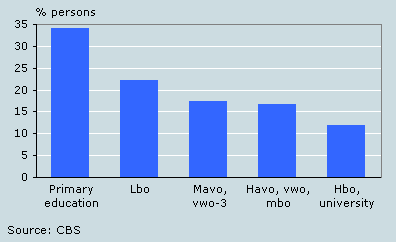Tenants feel less healthy

People in lower social strata are more often negative about their state of health than people of higher socio-economic status. Recent analyses show that, apart from income and education level, housing conditions play an important part in well-being.
State of health by housing situation, 2002

Tenants in cheap dwellings feel least healthy
The average tenant is less positive about his/her state of health than the average house-owner. The higher the value of the house, the healthier the occupant. This applies to tenants as well as house-owners. Occupants of houses in the very cheapest segment of the market are three times as often negative about their state of health as house-owners in the highest price bracket.
State of health by (standardised) household income, 2002

Income and education level
Income and education level are the most frequently used distinctive factors to classify people according to socio-economic group. Persons with a high spendable household income as well as a high education level more often have a health perception ranging from positive to very positive. These results are consistent with observations based on other surveys.
State of health by level of education, 2002

Independent roles for education, income and housing situation
If income and the combination of market value of a house and house ownership are taken into account, income and the combination of house characteristics turn out to be equally important with regard to perceived state of health. If the relation between income and education level is taken into account, education appears to have more impact on the perceived state of health.
Housing situation, income and level of education all separately contribute to a person’s perceived state of health. They are supplementary and not interchangeable.
Ferdy Otten and José Geurts (Statistics Netherlands), Jetty Dalstra and Anton Kunst (Erasmus University Medical Centre)